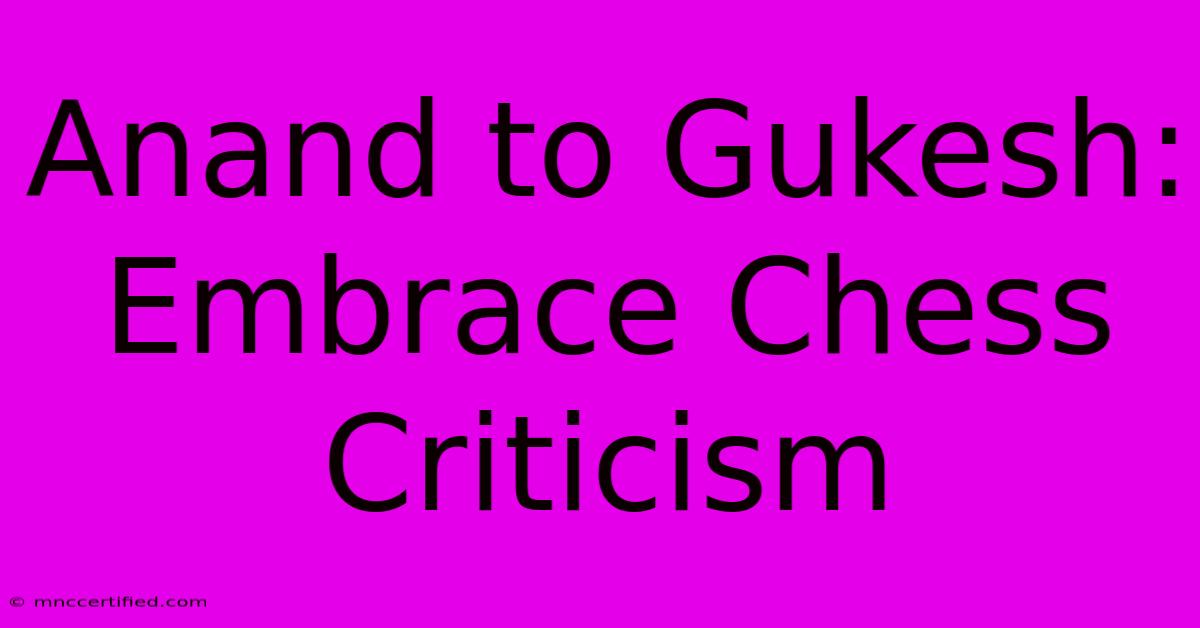Anand To Gukesh: Embrace Chess Criticism

Table of Contents
Anand to Gukesh: Embrace Chess Criticism – A Path to Grandmaster Glory
The chess world watched with bated breath as young Grandmaster Dommaraju Gukesh soared to new heights. His rapid ascent is undeniable, but even prodigies benefit from constructive criticism. Viswanathan Anand, a legend of the game, recently offered valuable insights into this crucial aspect of chess development, highlighting how embracing criticism fuels growth. This article delves into Anand's advice, exploring its relevance for Gukesh and aspiring chess players worldwide.
The Importance of Constructive Criticism in Chess
Chess, more than just a game, is a complex battle of strategy, tactics, and mental fortitude. Mastering it requires relentless self-improvement, a process significantly aided by external feedback. Constructive criticism, when delivered effectively, acts as a mirror, reflecting areas needing attention and guiding players toward refined strategies and improved decision-making. Ignoring it, however, can stunt growth and limit potential.
Anand's Wisdom: A Guiding Light
Anand, with his unparalleled experience and insightful analysis, understands the power of criticism better than most. His subtle yet pointed comments regarding Gukesh's game likely weren't meant as disparagement, but rather as a roadmap for future excellence. The nuances of grandmaster-level play are often subtle, requiring a keen eye and extensive experience to identify and correct. Anand's guidance provides Gukesh with precisely that – an expert's perspective to refine his already exceptional talent.
Specific Areas for Improvement: A Look at Gukesh's Game
While specifics from Anand's critique may not be publicly available, we can speculate on potential areas of improvement for Gukesh based on general observations of his play. These might include:
- Endgame Technique: While Gukesh excels in the opening and middlegame, refining endgame technique is crucial for consistently converting advantages.
- Time Management: Maintaining composure and efficient time management under pressure is essential at the highest levels.
- Opening Preparation: While possessing a broad opening repertoire, continually updating and adapting opening preparation based on current trends is vital.
- Psychological Fortitude: The mental aspect of chess is often overlooked. Maintaining focus and resilience even after setbacks is paramount.
How to Effectively Embrace Criticism
For Gukesh, and for every aspiring chess player, accepting criticism constructively involves several key steps:
- Active Listening: Truly listening to the feedback without defensiveness is crucial. Consider the critic's perspective and experience.
- Seeking Specific Feedback: Don't be afraid to ask specific questions to understand the criticism's basis. This fosters a deeper understanding of weaknesses.
- Self-Reflection: Analyze the critique alongside your own games. Identify patterns and recurring mistakes.
- Implement Changes: Don't just passively accept feedback; actively work to improve the identified weaknesses.
- Seek Multiple Perspectives: Gaining feedback from various sources, including coaches, fellow players, and even analyzing your own games independently, provides a well-rounded assessment.
Conclusion: The Path Forward for Gukesh and Beyond
Anand's implied message to Gukesh is clear: embrace criticism as a stepping stone to greatness. It's a lesson that transcends chess, applicable to any field requiring dedication and continuous improvement. By actively seeking and integrating constructive criticism, Gukesh can further refine his skills, solidify his position as a leading grandmaster, and inspire a new generation of chess players to embrace the power of feedback for self-improvement. His journey serves as a powerful reminder that even at the highest levels, continuous learning and self-reflection are key to achieving sustained success. The future of chess is bright, and Gukesh, with the right approach to criticism, is poised to illuminate it even further.

Thank you for visiting our website wich cover about Anand To Gukesh: Embrace Chess Criticism. We hope the information provided has been useful to you. Feel free to contact us if you have any questions or need further assistance. See you next time and dont miss to bookmark.
Featured Posts
-
Man Pleads Not Guilty Mace Assault Case
Dec 13, 2024
-
Nightreign Elden Ring Ign Review
Dec 13, 2024
-
Rainy Thursday Night Rams Win Over 49ers
Dec 13, 2024
-
Our Lady Of Guadalupe Juan Diegos Story
Dec 13, 2024
-
Zero Catches Kupps Fantasy Disaster
Dec 13, 2024